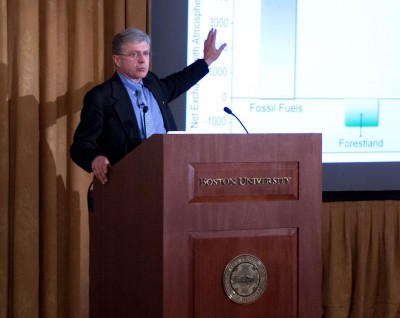
Anthony Janetos, director of the Frederick S. Pardee Center for the Study of the Longer-Range Future, speaks during a forum with the Board of Trustees Advisory Committee on Socially Responsible Investing Tuesday at the Trustee Center Ballroom. PHOTO BY MARY SCHLICHTE/DAILY FREE PRESS STAFF
Anthony Janetos, director of the Frederick S. Pardee Center for the Study of the Longer-Range Future at Boston University, spoke Tuesday night about climate change at a forum hosted by the Board of Trustees’ Advisory Committee on Socially Responsible Investing.
The talk was the last of three forums put on by the committee, which will help the ACSRI determine whether or not to recommend divestment from fossil fuels to the Executive Committee of the Board of Trustees.
Janetos emphasized that climate change is no longer something to avoid because it is affecting the United States and other parts of the world.
“We do not have the luxury to ignore what the facts tell us, or the experiences of others,” he said. “Human-induced climate change has moved firmly into the present.”
About 50 committee members, professors and students gathered at the Metcalf Trustee Center Ballroom in the Questrom School of Business.
The lecture focused on why the issue of climate change is so important, what is currently known about climate change and how it is known, the implications for the future and how to act today and adapt to change.
Throughout the presentation, Janetos displayed multiple graphs showing that sea levels, carbon emissions and temperatures have risen over the past 50 years.
For example, the past three successive decades have been the warmest decades on average in the instrumental record, Janetos said.
“In terms of trying to communicate about this, one thing many people respond to is ‘Oh, well the ’40s were cold,’ or the ’70s were cold and you can always find in a record like this where there’s lots of individual variation,” he said. “You can always find periods where the temperature doesn’t rise, but when you look at this time series over a substantial period of time, it’s actually quite clear what’s happening.”
When asked by an attendee what he thought the ACSRI should decide in terms of divestment, Janetos made no definite comment.
“Making a decision is in fact a symbolic gesture … It’s a political statement,” he said. “The question is if it’s the right kind of statement the trustees are comfortable making.”
Rick Reidy, a trustee and chair of BU’s Board of Overseers, concluded the lecture by speaking about a committee decision about divestment. He said even if the decision comes immediately and is approved by all necessary people, the university still needs to do more to make a change.
“One of the reasons these meetings are important are … we can all be more learned and go out and be ambassadors to our friends to our communities or whoever it might be, and teach them … in the end, it really is a political issue,” he said.
Edward Loechler, a professor of biology in the College of Arts and Sciences, said he is proud of BU for hosting the forums and giving serious consideration to the divestment movement. Compared to BU’s sister schools in the Boston area, he said, BU is being much more rational, thorough and deliberative on the subject.
“Even if we don’t divest, there will be all kinds of good ripples that come out of it,” he said after the talk.
Jackie Liederman, director of BU’s Cognitive Neurophysiology Lab, said she admired Janetos’ talk and his ability to convey the ideas seamlessly.
“I came because I’m interested in climate change, and I came because I knew that this would be a talk done by one of the most knowledgeable people in the world,” she said after the forum. “He not only covered the ground very completely, but he had figures and arguments that were much more persuasive and clear than many of the other arguments and figures that I’ve seen before.”
Several students said they enjoyed the perspective and information presented.
Tova Levin, a sophomore in CAS, said the talk prompted a sense of urgency to address the issue of climate change.
“Most of it was reaffirming the very depressing stuff I already knew,” she said. “Although it did squeeze the timeline a little bit because a lot of these issues are just exponentially accelerating, every time we get new data the deadline seems closer of that tipping point.”
Claire Richer, a senior in CAS, is the student representative on the ACSRI committee. She said the committee is still deliberating and currently there is no timeline for making an official decision.
“They [the forums] are really important to have just to educate the entire committee and also the BU community because before the committee makes any sort of decision, it’s really important to have a conversation about it,” she said. “It shouldn’t come out of the blue.”
Michael Dann, a graduate student in the Graduate School of Arts and Sciences studying climate change impact, said overall, the lecture covered all of the basics about the issue.
“It was a good intro to the wide range of impacts that climate change can have on our world,” he said. “I hope that this encourages the Trustees to review their decision to be involved in certain energy investments.”
The post ACSRI forum speaker examines broad implications of climate change appeared first on The Daily Free Press.
